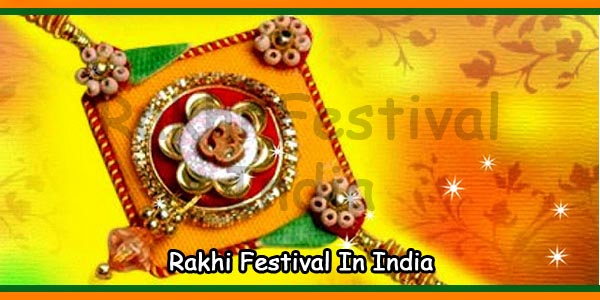Gifts have an important role in the celebration of Rakhi festival in India. When the sister ties the sacred Rakhi to her elder brother, he promises to protect her and gives her some attractive gifts. But if it is the younger brother, the sister gives him the gifts, besides tying Rakhi. Rakhi gifts usually consist of clothes, dry fruits, sweets, or any other attractive things.
Being a very significant festival in India, Rakhi is celebrated with high spirit and devotion. Brothers and sisters of India celebrate this festival with an intention to build up the everlasting bond of love between them. Though all sections of Hindu society all over India celebrate Rakhi festival, it is more famous in North India.
Legends of Rakhi:
There are many legends related to Raksha bandhan. Here is one of the most popular legends taken from Bhavishya Purana. In a battle between Gods and Demons, Demons led by King Bruta was advancing and Indra was facing defeat. To find a solution, Indra sought Guru Brihaspati’s help. As advised by the sage, Indra’s Queen Indrani tied a sacred thread empowered with mantras on Indra’s wrist at a specified time on the auspicious day of Shravana Purnima. By the power of this Rakhi, Indra won the battle against Demons. It is believed that from then onwards it became a custom for sisters to tie Rakhi to their brothers on the Raksha Bandhan day.

Customs and Traditions of Rakhi:
The customs and traditions to be followed on the Rakhi day are simple. Waking up early in the morning, people take bath and cleanse their body and mind. Mother and sisters of the family start preparing delicious festive food and a sweet dish. Then a sister prepares the Thali for Rakhi puja, which usually consists of Rakhi, tika, Diya, Sweet, and other necessary puja items required for the ritual. Then the sister, after performing aarti of his brother, ties Rakhi on his wrist and applies tika on his forehead. She prays for the well-being and happiness of her brother and feeds him a piece of sweet. Her brother, in return, presents gifts to his sister and takes pledge to protect her on all difficult times of her life. This simple ceremony of Rakhi builds up endless bond of love amongst brothers and sisters.
Rakhi Celebration in India:
Rakhi celebration in India begins almost one month prior to the festival. With a number of colorful Rakhi stalls multiplying all around, the markets display a festive appearance. Family members staying far from home plan their holiday to visit home for the family get-together.
People celebrate Rakhi with a high spirit and on this auspicious day there is happiness and harmony everywhere. It is the reunion of all members of the family, who perform the traditional ceremonies with full delight and verve. They share delicious food and enjoy a wonderful time.
Rakhi Purnima is celebrated throughout the country, but it has different names and different customs. In North India, it is popularly known and celebrated as Raksha Bandhan. On Raksha Bandhan day sisters tie Rakhi to the wrist of their brothers and pray for their welfare and long life. Bothers present gifts to their sisters and bless them. In the other parts of India, Rakhi is known under different names like Narial Purnima, Avani Avittam, Balev, etc., which are briefly summarised below.
Narial Poornima: In Maharashtra, Rakhi is called ‘Narial Poornima’ or ‘Coconut Full Moon’. Varuna, the Sea God, is worshipped on this day. On this occasion, in the famous beaches of Mumbai, people throw coconuts into the sea as an offering to God Varuna.
Avani Avittam: Rakhi, also known as Avani Avittam, is an important Hindu festival in South India. It is the day for the Brahmins to perform “upakarmam” and it is celebrated in different ways. The festival comes on the full-moon day of Shravan (August / September).
Balev: Rakhi is also known as Balev. It is an important day for Brahmins because on this day Brahmins change their sacred thread. On this auspicious day of Shravan Purnima the Brahmins take pledge to study the holy books of Vedas and follow the path of spiritual development.
